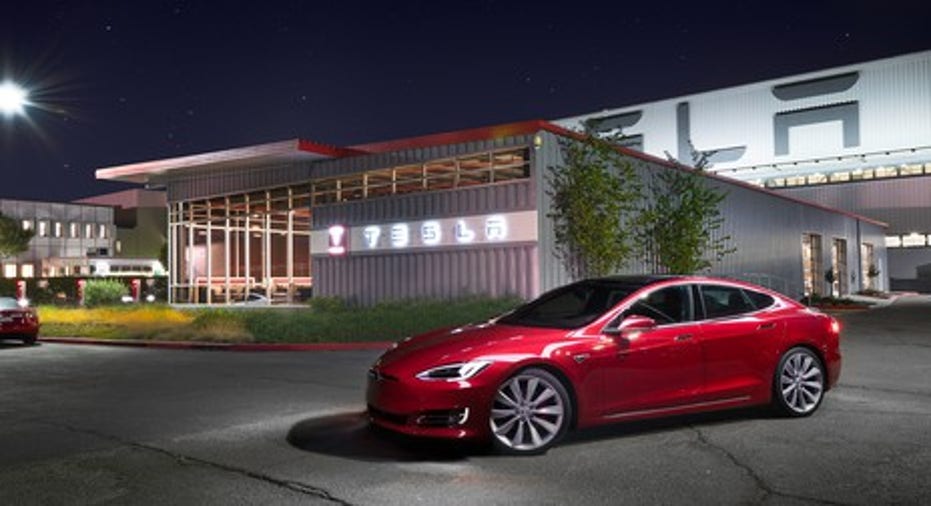It's Official: Tesla Is My Second 10-Bagger

I bought Apple the year before the iPhone debuted (July 2006 at a pre-split price of $60.83) and I bought Tesla (NASDAQ: TSLA) about 18 months before the Model S.
It was November 2010, less than five months after Tesla's initial public offering priced at $17 per share, raising approximately $225 million to help fund development of the Model S. While the $29.23 that I paid was a bit higher than that offering price, it's worked out quite well in the nearly seven years since, as I still maintain the position to this day. Just yesterday, Tesla tapped a fresh all-time high, surpassing the prior high of around $291 set in September 2014 and exceeding the $292.30 price that technically represents my threshold for 10-bagger territory. Shares continued running today.
My original Tesla trade confirmation. Image source: Author.
Don't get me wrong. Like most investors, my investing career is littered with as many mistakes as successes, if not more. But in today's climate of active trading and years of debate around the "death" of buy-and-hold investing, a little celebration is in order: Long-term investing can still pay off.
I got lucky
I won't purport to have had some insightful epiphany in 2010 regarding the future of electric cars; I was just a naive stockbroker at the beginning of my career in finance. As environmentalists, my wife and I simply thought Tesla was worth supporting. In other words, we got lucky to some extent, at least initially. It's notably harder to have the discipline to maintain such a position, particularly considering Tesla stock's volatility and polarizing nature.
Image source: Tesla.
What's most important, though, is what comes next. There's an endless debate about Tesla's valuation, as the company's market cap has just surpassed Ford's and is now approaching GM's. Ford sold 6.7 million vehicles last year, while GM sold 10 million; both are solidly profitable.
Tesla delivered 76,000 vehicles in 2016, losing $773 million in the process. These facts often and justifiably confound analysts, investors, and industry pundits alike. Hardly a day goes by without someone arguing that Tesla is overvalued, which is hard to dispute using traditional valuation metrics. As CEO Elon Musk pointed out today on social media, valuation is more about the future than it is the past.
The biggest pitfall of valuation
So much of valuing stocks is fundamentally predicated on comparable analysis. Tesla makes cars, so the tendency is to compare it to automakers. However, Tesla's similarities to the auto industry end there. Tesla is as much an energy company as it is an auto company. It has been working on battery technology for years through its partnership with Panasonic, and is stepping directly into the solar industry with 2016's acquisition of sister company SolarCity. It is more vertically integrated than traditional automakers, particularly when it comes to the integration of hardware and software. It uses a direct model for both sales and support, eschewing the antiquated dealer model. It goes without saying that Tesla utilizes an entirely different propulsion technology to power its vehicles. These are but a few differences, but they easily outnumber the similarities.
This says nothing as to whether or not these differences will ultimately prove advantageous or not. Only time will answer those questions. The point is that Tesla is an amalgam of auto, tech, and energy companies, and there is a dearth of comparable peers. The closest company that comes to mind is China's BYD, which stands for "Build Your Dreams." Warren Buffett famously invested in BYD years ago. BYD is the only other notable company that produces electric cars, battery storage, and solar panels.
But even then, the comparison falls short. Beyond EVs, BYD also offers products like buses, forklifts, and commercial trucks, all of which are electric. Even in the passenger car market, BYD targets the more affordable midrange segment instead of luxury vehicles. Additionally, BYD operates in an entirely different geopolitical environment halfway across the world.
BYD is also much larger in terms of revenue ($14.5 billion in 2016) but also profitable ($733 million in 2016). For reference, BYD trades at about 1.2 times sales, significantly lower than Tesla's 6.9 P/S multiple.
To be clear, I'm the first to admit that it's incredibly difficult to justify new positions in Tesla at current levels, because so much of the value is baked into the future. The valuation magnifies the execution risks that Tesla faces in the years ahead, and there will be many. I just happen to be fortunate enough to have such a low cost basis, and I fell victim to the "house money effect" long ago, so I'm content to let it ride, despite the risks.
10 stocks we like better than TeslaWhen investing geniuses David and Tom Gardner have a stock tip, it can pay to listen. After all, the newsletter they have run for over a decade, Motley Fool Stock Advisor, has tripled the market.*
David and Tom just revealed what they believe are the 10 best stocks for investors to buy right now... and Tesla wasn't one of them! That's right -- they think these 10 stocks are even better buys.
Click here to learn about these picks!
*Stock Advisor returns as of April 3, 2017
Evan Niu, CFA owns shares of AAPL and Tesla. The Motley Fool owns shares of and recommends AAPL, F, and Tesla. The Motley Fool has the following options: long January 2018 $90 calls on AAPL and short January 2018 $95 calls on AAPL. The Motley Fool has a disclosure policy.